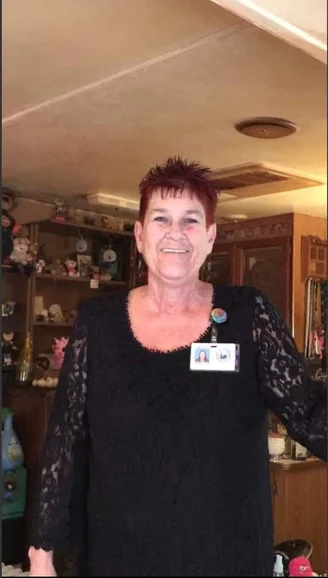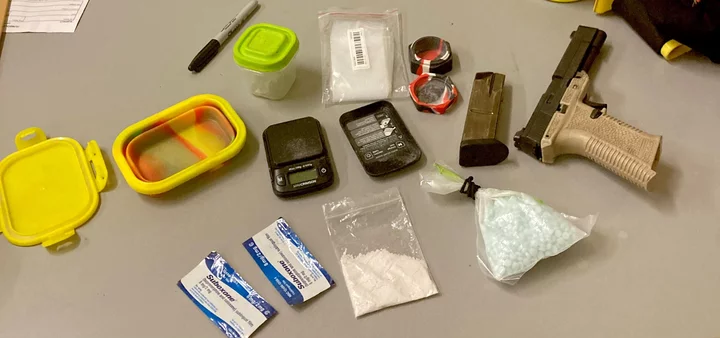HUMBOLDT HISTORY: When the Syrup Extracted From Humboldt Tan Oaks Fueled the West Coast Leather Industry … and the Local Economy
Ruth and Links Carranco / Saturday, July 8, 2023 @ 7:15 a.m. / History
The Wagner Leather Company’s tan bark extraction plant in Briceland in 1910. Photo via the Humboldt Historian.
People at the present time may be surprised to know that the manufacture of leather was the third most important industry in Humboldt County during the late 188Os, 189Os and the early 1900s. In 1893, there were three tanneries: one in Arcata, one near Eureka, and one at Rohnerville. The bark for tanning was obtained from the tan-bark oak forests in the county, and part of raw hides were supplied by butchers of the county, but the larger portion was procured from San Francisco.
In Southern Humboldt County, the Wagner family from Stockton built the only extract plant on the Pacific Coast. It all started when Grandfather Charles Wagner came to California from Germany as a young man of eighteen to join the gold miners and to escape recruitment for the Kaiser’s Army. He went to the Mother Lode Country but failed to find gold. His father had operated a tannery in Germany, and Charles had worked for him. At this time there was a huge demand for buckskin, and Charles decided to build a tannery in the town of Stockton on the San Joaquin River.
In order to cure and preserve the skins from the animals, the chemical extract, tannic acid, was needed. This ingredient was obtained from the oak trees in Sacramento Valley. Charles married and a son, Edward, was born, who later joined his father in the tanning business.
The Wagners ran out of oak trees, and the two of them made a trip into Northern California in 1901 where they discovered a good concentration of California tan oak trees which grew among the redwoods in the watershed of the area near Briceland in southern Humboldt County. Here the Wagners decided to build an extract plant which would be cheaper and more convenient the than shipping the tan oak bark to Stockton.
In order to get the tan oak trees, the Wagners had to buy land and stumpage rights on the lands of the homesteaders. Many of the homesteaders found that they could not make a living on their forty acres of poor land, and they sold out to the Wagners who finally acquired some 7,000 acres. In 1902, the Wagners built a huge extract plant at Briceland, the only one of its kind on the Pacific Coast. In order to get the thick extract liquid called “molasses,” large redwood tanks, 12 feet in diameter and 20 feet high were installed in a large two-story building. Then by a simple process, like making coffee iu a percolator, the ground-up bark would be put in the false tops and hot water would be pumped over and over the bark chips until the bark was spent. The dark water would then be pumped into another tank with fresh bark to strengthen the liquid. This process was repeated through six tanks until the liquid was pumped into a huge copper vacuum where it was boiled down to make a thick molasses-like consistency.
This heavy concentrate of tanning material was then poured into a barrel, and was like “getting several cords of bark into one barrel.” These heavy barrels were moved by teams to Shelter Cove, and then by a contracted ship to the Stockton plant where the “molasses” was emptied into vats to determine the proper strength for tanning. This was a cheap way to send the tanning ingredient to Stockton.
At the Briceland plant there were drying sheds for the bark, a barrel factory where 50-gallon oak barrels were made to transport the syrup extract, and a barn yard which contained a blacksmith, a mule-shoeing man, and 100 mules. There were also bunkhouses and a cookhouse building where “logger” meals were served.
The plant only operated in the summer because the road to Shelter Cove was too muddy during the rainy season. The Wagners employed about 100 local people during the summer, and Briceland was a bigger town at that time than Garberville. The town consisted of a store, a hotel, several saloons, and many homes.
Two woods camps were usually established in a central location in the woods where there was a cook tent, a dining tent, and sleeping tents for the men. The bark was usually collected in the spring when the sap was running and the bark could be easily split. First the bark was cut and taken from the lower trunk of the tree, and then the bark of the tree was cut from the top down, and the rest of the bark was removed. There was much waste in the barking operations. The bark was stacked along the trails, and loaded on mules which took the bark out of the canyons up to the roads where the bark was loaded onto horse wagons and taken to the Briceland plant where it was dried for one year before being processed.
The big problem in the tan bark operation was the roads.
These were only pack trails to Shelter Cove, and the Wagners had to build a road for the wagon trains with horses and plows and Fresno scrapers. The roads were built along the ridges so that there would be little dirt to move and where the rains would not wash out the roads.
Four fifty-gallon heavy barrels, weighing 300 pounds each, were placed on wagons and drawn by six horses. Halfway between Briceland and Shelter Cove a camp was established with a barn, feed, and relief teams. The teamsters with their wagons would start at daylight and arrive at the halfway station or “nooning grounds” at noon. A wagon would also arrive about the same time from Shelter Cove with a load of merchandise, and the teamsters would exchange loads. After getting fresh horses, the teamsters would head back to their respective areas. The steep terrain and weight of the barrels were a severe strain on the horses and they would be relieved at the halfway point. By this procedure, each teamsters could go back home every night.
The Wagners operated the extract plant for twenty years, from 1902 to 1922. In time Grandfather Charles Wagner turned the plant over to his son Edward who spent part of the summers in Briceland. Edward and his wife had two were born in the early 1900’s. Every summer the boys and their mother would come to Briceland. They started their long trip from Stockton to San Francisco where they stayed overnight. Then by train they arrived in Willits where they again spent the night before taking the train to Fort Bragg on the coast. The next day they traveled by horse stage to Usal where they spent the night, and the next day to Four Corners where there was a rig waiting to take them to Briceland.
When Edward and Charles got older, they went to work in the family business. About 1921, the Wagners ran out of tan bark, and they wanted to relocate their plant near Highway 101 in order to have access to more areas of tan bark. The County would not help them build a road, so the Wagners decided to forget the new venture. As time went on, the demand for tannic acid and leather declined sharply.
The reason for the decline was that from 1900 to 1920 there was a huge market for leather goods in the Orient, specifically in Japan and China. The aggressive Japanese came to America where they learned the business and hired men to build plants in Japan where they developed their own industry and took over the Orient trade. The local domestic market for shoe leather was very small because most shoes were made in the East.
About 1928, all the tanneries on the Pacific Coast went out of business. The Wagners closed their Briceland plant in 1922 and the Stockton plant in 1928.
When the tannery closed in Stockton, Edward, who always liked to fly, took over the Stockton airport. When World War II started, he signed a contract with the Government to train pilots at Carson City, Nevada. When there was a surplus of pilots in 1944, Edward, in order to help the war effort, came back to the Briceland acres to develop a sheep ranch. He ranched until 1970 when he retired. He now lives in Garberville and spends his leisure time traveling in foreign countries.
His young brother, Charles, who has two degrees from Stanford, a B.A. in Chemical Engineering and an M.A. in Business Administration, took over the tannery buildings in Stockton and developed a successful moving and storage business He is now semi-retired, and maintains a second home near Garberville.
The Wagner acres near Briceland are now managed by professional foresters who follow a cycle of rotation. Trees are planted, and over half a million feet of timber is cut each year and sold to the local mills. The Wagners purchased more land recently and are now harvesting Monterey pines.
When their father died in 1940, the boys wanted to establish a memorial for him in the form of a redwood grove because he had been a pioneer in southern Humboldt County. They were able to purchase 80 acres of virgin redwood six miles north of Prairie Creek Park, and they established the Edward Wagner Memorial Grove in his honor.
###
The story above was originally printed in the November/December 1977 issue of The Humboldt Historian, a journal of the Humboldt County Historical Society, and is reprinted here with permission. The Humboldt County Historical Society is a nonprofit organization devoted to archiving, preserving and sharing Humboldt County’s rich history. You can become a member and receive a year’s worth of new issues of The Humboldt Historian at this link.
BOOKED
Today: 6 felonies, 9 misdemeanors, 0 infractions
JUDGED
Humboldt County Superior Court Calendar: Friday, Feb. 13
CHP REPORTS
Sr200 / Hunts Rd (HM office): Traffic Hazard
0 Weott Ofr (HM office): Traffic Hazard
3200 MM101 S HUM 32.00 (HM office): Trfc Collision-Unkn Inj
US101 S / SOUTH FORK OFR (HM office): Trfc Collision-No Inj
ELSEWHERE
RHBB: RV Fire Near Founders Grove
Politico Magazine: The Friday Read ‘The Industry Comes In and Kills the Work of Local Citizens’
The Guardian: Anatomy of an upset: how Ilia Malinin lost Olympic figure skating gold
The Hill: Democrats say Trump’s climate rollbacks ‘corruption in action’
OBITUARY: Kathryn (Douglass) Hapgood, 1952-2023
LoCO Staff / Saturday, July 8, 2023 @ 6:56 a.m. / Obits
Kathryn (Douglass) Hapgood won the race and went home to be with Jesus on May 16, 2023. She left peacefully while at home being cared for by those she loves most.
Kathy was born to Eddie and Ruth Douglass on May 14, 1952, in Paso Robles, Calif. The second to the youngest (by seconds) of five girls. She grew up in Paso Robles and Atascadero. She met the love of her life, Robert Hapgood, at age 15 in San Luis Obispo. She graduated from Atascadero High and attended Cuesta Junior College focusing on early childhood development. She married Bob on December 19, 1970.
Bob and Kathy spent the early part of their marriage in the San Luis Obispo county area. They moved to Paradise in 1973, where they welcomed their first child. In 1976 they became Christians and Bob found his calling to be in the ministry - they moved to San Jose for Bible college where they welcomed their second child. They moved a few more times as they were led and in 1982, they moved to Fortuna to be a part of Grace Chapel. In Fortuna, they welcomed their third and fourth children. They became an established part of the community in Fortuna, with Kathy teaching preschool and Kindergarten at Christian schools for over a decade. In 1996, she started working for C. Crane and worked there until right before her death.
Kathy was a hard worker, a woman who couldn’t even hold still long enough to watch a movie. The only time she was still was when reading or doing a puzzle. She could clean like nobody else and had very high standards for what clean looked like. She loved to garden and was very proud of what she created in her yard. She was feisty and direct and you always knew where you stood with her. She loved playing cards and spending time with friends. She loved the Warriors and hated the Cowboys and enjoyed watching sports with her son Chris.
Kathy loved God with all her heart. She was a true example of enduring love for her family. A Proverbs 31 woman. She loved her husband of 53 years. Her children were so fortunate to have a mother who loved them. Her grandchildren were fortunate as well to have such a great Mema. She always made sure to have something special, a favorite drink, a favorite snack, or dessert, for the people she loved. She leaves behind a legacy of love.
She is preceded by her parents Eddie and Ruth Douglass, her son Andrew Hapgood, and her grandson Zachary Gillette. She is survived by her husband Robert (Bob) Hapgood, her daughter Jessica Crotty and grandchildren Jordan Gillette, Drew Gillette, Emma Crotty, and Skylar Crotty, and her sons Joel Hapgood and Christopher Hapgood and by her four sisters, her twin, Thelma Irvine, Loretta Rowlett, Jeri Hart, and Carol Morrison.
The family would like to extend a huge amount of thanks and gratitude to Hospice of Humboldt, who were amazing in their care and compassion. Also, to all the friends and family and extended church family who showed up at the hospitals and at home coming alongside us as we traveled this unexpected journey. To Redwood Christian Fellowship, there are no words to express how much your support has meant.
The community is invited to a Celebration of Life to honor Kathy’s memory on Saturday, July 29, 2023, at 2 p.m., at the Campton Heights Baptist Church, 1655 Cecil Ave, Fortuna.
Memorial donations in Kathy Hapgood’s name may be made to Hospice of Humboldt or to the charity of your choice.
###
The obituary above was submitted on behalf of Kathy Hapgood’s loved ones. The Lost Coast Outpost runs obituaries of Humboldt County residents at no charge. See guidelines here. Email news@lostcoastoutpost.com.
OBITUARY: Melody Lynn Molver (Presley), 1964-2023
LoCO Staff / Saturday, July 8, 2023 @ 6:56 a.m. / Obits
Melody
Lynn Molver
(Presley)
November
20, 1964 - June 20, 2023
Melody was born in Garden Grove, Calif. on November 20, 1964, which also happened to be her parent’s wedding anniversary.
She grew up in Norco, Calif. and was part of 4H as well as she was in the band as a baton twirler. She was a huge animal lover from a young age. She rode horses and raised pigs in her younger years.
In 1981 she met and married her first husband David and had her first daughter Crystal in 1982. In 1984 they moved to Eureka with her brother Mark Presley.
In 1986 she moved back to Southern California to be closer to her parents. She met her husband and the love of her life, Teghe Molver, in 1995. They had their daughter, Cheyenne, in 1999 and were married in 2001. With marrying the love of her life she took on two more kids that she raised and loved with all of her heart — Michael Cruz Molver and Clarissa Sueleann Grimm.
Melody decided after both of her parents passed that she wanted to live in the redwoods so in 2010 she packed up her family and moved to Trinidad, where she happily lived out the rest of her life.
She worked at Cher-ae Heights Casino for many years and many departments. She loved all of the people she worked with and seeing all of her regular customers in the gift shop.
She is preceded in death by her mother Fern Wight, her father Richard Wright, her brothers Mark Presley, Hugh Wright and Ralph Wright.
She is survived by her daughters Crystal Brown, Cheyenne Molver, Clarissa Grimm. Her son Michael Molver, her husband Teghe Molver and her brother Bill Wright.
Thank you all so much for loving my mother as much as her family did and does
There will be a celebration of life on July 20, 2024.
###
The obituary above was submitted on behalf of Melody Molver’s loved ones. The Lost Coast Outpost runs obituaries of Humboldt County residents at no charge. See guidelines here. Email news@lostcoastoutpost.com.
OBITUARY: Carolyn Ann Luis (Cupp), 1964-2023
LoCO Staff / Saturday, July 8, 2023 @ 6:56 a.m. / Obits
Carolyn
Ann Luis (Cupp)
September
18, 1964 – June 25, 2023
Carolyn Ann Cupp was born September 18, 1964, in Crescent City to Morgan “Bud” and Alice Cupp and she left to be with our lord on June 25, 2023 at the age of 58.
Carolyn grew up in Crescent City and attended Bess Maxwell and Crescent Elk, and then graduated from Del Norte High School in 1982. She enjoyed being a part of the baton and dance group where they were in the fair and parades performing different dances and marching twirling batons. Carolyn was in Girl Scouts and had her mom as her leader for several years. She loved going four wheeling with the family - and oh the stories they can tell, spending time with family playing in the snow, surfing with friends and camping especially at Siskiyou Forks. Carolyn was daddy’s little girl until the day she left us. She became a type 1 diabetic at 8 years old after slipping into a coma for three days. She was told she would never have children or live a full life, but she didn’t let that stop her from living life the way she wanted.
After graduation Carolyn along with her mom and dad moved to Blue Lake, where she started her life as a mother, which she never thought would be possible. She met the love of her life, David Luis, in 1991, and they later married in 1998 and built a life with in Eureka. They celebrated 19 years of marriage before separating and co-parenting as friends. Carolyn worked several different jobs trying to see where she wanted to be, from waitressing at the Pantry to being a CNA in an assisted living facility to in-home health care, working at Winco, Target and being a stay at home mom and later grandma.
Carolyn is survived by her dad and mom, Bud and Alice Cupp, husband David Luis Sr, daughters Terra Cummings (Josh), Jennifer “Jenny” Cupp (Jim), son David Luis Jr (Elizabeth), granddaughters Kaitlyn, Emmalyn, Paige and Kali Cummings, grandsons Jaxon and Radley O’Garey and nephews Ryan and Adam Cupp and numerous Aunts and Uncles, Cousins, in-laws and friends of which there are too many to mention but never forgotten.
She is preceded in death by her brother Walter Cupp, grandson Caleb Cummings, father in-law Elvin Luis, and numerous grandparents, great-grandparents, aunts, uncles, cousins, in-laws and many others.
There will be a celebration of life on Saturday, August 12, 2023 at The Church of Jesus Christ of Latter-day Saints 2806 Dolbeer St, Eureka, CA at 1 p.m.
###
The obituary above was submitted on behalf of Carolyn Cupp’s loved ones. The Lost Coast Outpost runs obituaries of Humboldt County residents at no charge. See guidelines here. Email news@lostcoastoutpost.com.
MAKEOVER! Once the Biggest Eyesore in Old Town, the ‘Heroin Hilton’ Will Soon be Transformed Into a Unique Hostel
Stephanie McGeary / Friday, July 7, 2023 @ 4:34 p.m. / Eureka Rising
The once-dilapidated “Heroin Hilton” building on Third Street as it looks today | Photos: Stephanie McGeary
###
Nearly six years after the the City of Eureka condemned the notorious apartment building across the street from the Shanty on Third Street, long referred to by locals as the “Heroin Hilton,” the building is getting a much-needed makeover. If everything goes according to plan, it’ll soon be converted into a hostel that will welcome travelers to the Old Town neighborhood.
After the building, previously owned by infamous local slum-lords Floyd and Betty Squires, was closed for what the city deemed “unsafe and unsanitary conditions” – including containing large quantities of hypodermic needles, feces, hazardous wiring and plumbing and cockroach infestations – the then-dingy cream-colored building was boarded up. It sat that way for years.
Then, in September 2021, the space was purchased by local nonprofit Westside Community Improvement Association (WCIA), with financing help from the Redwood Region Economic Development Commission. WCIA’s goal is to transform the neglected building into a beautiful boutique hostel and apartment building that will create jobs and promote tourism in Old Town. The name of the new facility will most likely be the Skyhorse Lodge.
“This is really about reenvisioning and reinventing that corner of Old Town,” Heidi Benzonelli-Buden, president of the WCIA, told the Outpost in a phone interview Thursday. “Once we are operational this [business] will be transformative.”
The WCIA, which aims to revitalize Eureka buildings and neighborhoods while creating jobs and educational and recreational opportunities, is best known for its work on the Jefferson Community Center and Park – a once abandoned school campus that the group purchased and transformed into a vibrant community hub, which holds classes, a bike library, a community garden, child care services and much more.
A few years ago the WCIA also started a workforce training program, using funding from the California Community Reinvestment Grants Program, which aims to improve health, wellness and economic justice for communities harmed by the War on Drugs. Benzonelli and the WCIA used the funding to create a 13-week construction training program for recovering addicts and formerly incarcerated individuals to help them re-enter the workforce.
Working with individuals referred from other local work programs or recovery centers, including the Sheriff’s Work Alternative Program (SWAP) and UPLIFT Eureka and Waterfront Recovery Services, the WCIA helps the participants receive EPA Lead-Safe Renovation training and provides them with a paid job under the guidance of a professional contractor. One of the job-training “cohorts,” as WCIA calls them, restored a recovery house on 14th and C Streets. Now the same program is being used to work on the former “Heroin Hilton” on Third Street.
Auriah Milanes, project manager for the renovation, told the Outpost that his team has already accomplished a lot of work on the building, including restoring some of the windows and ripping out the “nasty stuff” from the inside. There is still a lot of work to be done, but most of it will have to wait until the city has approved the necessary permits, Milanes said.
Until then, renovation efforts will mostly be focused on the building’s exterior. And if you’ve been past the building recently, then you know that a lot of progress has already been made. Roughly six months ago, the building was completely repainted in vibrant purples, with floral designs by local artist Blake Reagan decorating the boards on the building’s facade. For about the last month, Reagan has been working on a large mural (which is almost complete) on the west-facing wall, featuring a scene of wildflowers, grass, blue sky, clouds and a mirror-surfaced orb that reflects the images of the neighboring business the Shanty and North of Fourth and a cloud in the shape of Pegasus, in honor of the Skyhorse name.
Reagan has previously done murals for the Jefferson Community Center and said he was excited to be approached by Benzonelli for this project, which gives him the opportunity to do what he loves the most: transforming ugly walls into beautiful ones.
“[We’re] taking what was the biggest blight in Old Town and making it into kinda the coolest building in Old Town,” Reagan told the Outpost, while he was working on the mural earlier this week.
The WCIA really wanted to prioritize improving the building’s “curbside appeal,” Reagan said, which is why he painted the temporary murals on the boards that cover the front door and windows. Once the new windows and door are installed, Reagan’s art will be moved inside of the building for display, he said. Though Reagan only painted the art and not the rest of the building, he did get to select the shades of purple for the building.
Local muralist Blake Reagan working on the building’s new mural
“I figured this building really needed a healing color to come into its new place in our community,” Reagan said. “I looked up and down Third Street and was like, ‘What color does this street need?’ There’s a lot of beige and a lot of gray. I thought, ‘Let’s give this town some color!’ And I think more building owners should be doing that.”
Once construction is complete, which will likely be at least a year from now, Benzonelli said, the top floor of the building will hold the hostel and have a combination of multi-bed dorm rooms, and three-person private rooms to rent nightly for travelers. Downstairs there will be an ADA-accessible room, as well as a common kitchen, laundry room and community room for guests to use. The building will also hold several apartments for workforce housing – one that will be for the innkeeper and others that can be rented for long-term stays.
The WCIA’s work-training program will also continue to be utilized to operate the hostel, once it is open. Individuals in the program will receive training in hospitality and customer service and will be given the opportunity to work in various positions in the hostel, including as receptionists, cleaning crew or even as a doorman. (Yes, Benzonelli said that the hostel will have a doorman and will provide a higher level of service than is typical for a hostel.)
Benzonelli said that the team is really not trying to rush the completion of this project and she wants it to be done right. She is hopeful that construction may be complete by next year, but said that realistically the hostel will probably open in early 2025. For those who want to see the progress, the WCIA is holding an event at the space on Sept. 30. To honor the wishes of the late Richard Evans, who worked with the WCIA, the organization will be auctioning off some of Evans’ art and pieces donated by other local artists. All of the proceeds will go toward Evans’ favorite local nonprofits.
The event will also be the first time the Skyhorse building will be open to the public since WCIA took it over. And though the project certainly won’t be complete by this September, Benzonelli invites people to come see the progress that has been made and to learn more about the future of this exciting new addition to Old Town and the good work that the WCIA is doing.
“We have created jobs, opened buildings and invested in the community,” Benzonelli said. “We’re making progress where people matter.”
Fentanyl and Illegal Guns Seized at Eureka Residence After Weeks-Long Investigation Into Convicted Felon, Drug Task Force Says
LoCO Staff / Friday, July 7, 2023 @ 4:04 p.m. / Crime
Press Release from the Humboldt County Drug Task Force:
On July 4th, 2023, Officers with the Eureka Police Department conducted a traffic stop on Raymond Allen Payton (age 31), in 1000 block of Broadway in Eureka. After a multi-week investigation, the HCDTF believed Payton was in possession of large quantities of fentanyl pills and several firearms. Payton is a convicted felon and on felony probation with a search clause.
During the traffic stop, EPD Officers found a loaded .38 caliber revolver and a small amount of fentanyl in Payton’s possession. When EPD Officers checked the serial number on the firearm it was confirmed to be stolen. Due to the narcotics and the stolen firearm located in Payton’s possession, Agents with the HCDTF and Officers with the Eureka Police Department responded to Payton’s residence in the 200 block of Sonoma St., Eureka, to conduct a probation search.
During a search of Payton’s residence Agents located 600 fentanyl “Perc 30” pills, over a 1/4 ounce of fentanyl powder, digital scales, packaging materials, and a non-serialized .40 caliber handgun.
Payton was arrested and transported to the Humboldt County Jail where he was booked for the following charges:Anyone with information related to this investigation or other narcotics related crimes are encouraged to call the Humboldt County Drug Task Force at 707-267-9976.
- 11370.1(A) Possession of a controlled substance while armed with a loaded firearm
- 29800(A)(1) PC Felon in possession of a firearm
- 25850(A) PC Unlawful possession of firearm on person/vehicle
- 25400 (A)(1) PC Unlawful possession of concealed handgun on person/vehicle
- 11351 HS Possession of narcotics for the purpose of sales
Man Driving on Suspended License in Garberville Found With Drugs and Weird Explosives, Sheriff’s Office Says
LoCO Staff / Friday, July 7, 2023 @ 2:57 p.m. / Crime
Press release from the Humboldt County Sheriff’s Office:
On July 6, 2023, at about 4:03 p.m., a Humboldt County Sheriff’s deputy on patrol in the Garberville area conducted a traffic stop for a vehicle code violation near the intersection of Locust Street and Maple Lane.
Deputies contacted one occupant of the vehicle, 52-year-old Massai James Moser. Deputies learned that Moser was driving with a suspended license. During contact with Moser he had refused to produce his driver’s license and refused to comply with commands to exit the vehicle.
Deputies placed Moser under arrest for driving without a license and for resisting a police officer.
During a search of Moser and his vehicle incident to arrest, Deputies located a cylindrical tin can containing explosive flash powder, 6.5-feet of green cannon fuse, a clear bag containing ¼-inch ball bearings, 6.5-inch double edged dagger, semi-automatic 22 caliber rifle and ammunition, two grocery bags of commercially concentrated cannabis, and 3.55 grams of methamphetamine.
Moser was arrested and booked into the Humboldt County Correctional Facility on charges of driving with a suspended license (VC 14601.1(A)), resisting a peace officer (PC 148(A)(1)), felon in possession of ammunition (PC 30305(A)(1)), felon in possession of firearm (PC 29800(A)), possession of a controlled substance while armed with a firearm (HS 11370.1), possession of concentrated cannabis over 1 oz (HS 11357(B)), possession of bomb making materials (PC 18720), possession of a dirk or dagger (PC 21310), and possession of a controlled substance (HS 11377).
Anyone with information about this case or related criminal activity is encouraged to call the Humboldt County Sheriff’s Office at (707) 445-7251 or the Sheriff’s Office Crime Tip line at (707) 268-2539.












